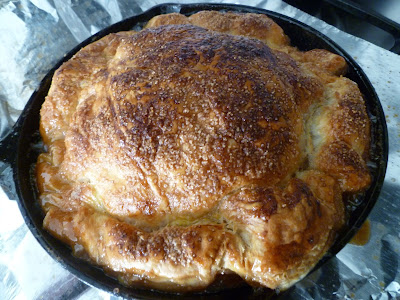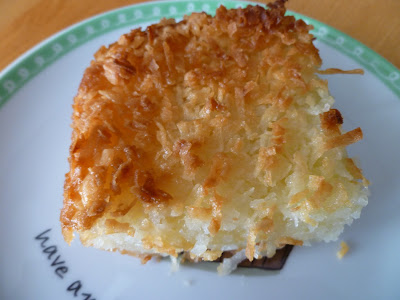You remember my grand decluttering effort which included
paring down my collection of baking books? Which also involved my going through
them first in case there are any recipes I wanted to get out of the books
before I gave them away? Of course it’s been slow going but it has been going.
Case in point, I leafed through this baking book and really only found 1 recipe
I wanted to make out of it so it seemed like a good idea to try out that one
recipe then donate the near-pristine, good-as-new book to my local library for
their next book sale. Win-win.
Astonishingly, I had all the ingredients for this recipe
on hand when I went to make it. Including a random sweet potato I had bought
for another recipe but hadn’t gotten around to using yet and a forlorn sheet of
frozen puff pastry sitting in my freezer from my last foray into puff pastry
baking.
I had made a more traditional tarte tatin when I was in culinary school although that was with apples, not sweet potatoes. But I love all things sweet potato so I was intrigued enough to try this one. However, I will admit, I do not have fond memories of making tarte tatin at the Culinary Institute. Mostly because the biggest pain in the right butt cheek with tarte tatin is flipping it over when it was done without burning yourself on the boiling hot caramel at the bottom-then-top of the tart. Which has a distressing tendency to splash over your hand(s) when being flipped over. It’s like caramel’s revenge for the indignity of being flipped over.
Nevertheless, I took it on because that’s what makes a tarte tatin – you prepare caramel from scratch (from scratch, people – you know I almost never do that), pour it on the bottom of the pan, place the slices of sweet potatoes over the caramel (ideally in a pretty pattern but this is me so let’s not kid ourselves), cover it with the puff pastry then bake until pastry is golden brown and, well, puffy. When you take it out, you immediately flip it over onto a waiting serving plate and in an ideal world, you have a beautifully caramelized tarte.When you leave that ideal world and come into my world, you have a caramel I didn’t cook long enough to get caramel-y. Meaning the recipe instructions say to boil the sugar-water mixture until the caramel registers 350 degrees on a digital thermometer. Yeah, did that and the caramel was pasty and anemic-looking. Against my better judgment and baking instincts, I took it off the heat once the thermometer pronounced 350 degrees and poured it into my cast-iron pan. Arranged the not-quite-evenly-sliced sweet potatoes over the caramel (my knife skills are nothing to brag about, hence the unevenness) and covered the whole thing with the thawed sheet of puff pastry. I think the only thing I did right was to bake it the right amount of time, until the pastry was nicely golden brown but not too light.
Then the litmus test that all pastry chefs who make tarte tatin need to pass – flipping the cast iron pan over and getting the tarte tatin right side up without incurring third-degree burns from the caramel. I sort of passed. If you didn’t count the hot caramel that coursed out of the pan onto my dishcloth prudently laid on my counter top (I know my weaknesses) and the inevitable-to-me splash of caramel onto my hand. Yeah, that hurt. So I didn’t really pass that test.
After doing myself bodily harm making this, I would like
to tell you this was the best thing I ever ate and worth the burn marks.
Unfortunately that would be a lie. Because I didn’t cook the caramel long
enough to actually caramelize, it was more sweet, anemic, liquid sugar than real
caramel. The sweet potatoes were cooked perfectly, likely more by accident than
anything I did, but they were just sweet potatoes with a thin covering of “caramel”.
I like all things puff pastry but it didn’t work well here since the caramel
soaked into it and took away the flaky crispness of a good puff pastry. So much
for my foray into the world of something different. Next time, if I’m crazy
enough for a next time (once my burn wounds heal), I think I’ll stick with a
more traditional apple tarte tatin.
One sheet all-butter puff pastry, thawed
¾ cup sugar plus 1 tablespoon for pastry
1 stick unsalted butter, cut into 16 pieces
2 teaspoons vanilla extract
1/8 teaspoon salt
1 ½ pounds sweet potatoes, peeled, ends removed and
sliced into 1/8-inch thick rounds
1 large egg
1 tablespoon milk
- Heat the oven to 375 degrees F. Line a baking sheet with parchment paper. Place the puff pastry sheet on your work surface and cut out a 10-inch circle. Set the circle on the prepared baking sheet. Prick the pastry all over with a fork and refrigerate.
- Place ¾ cup sugar in a small saucepan and cover with ¼ cup water. Gently stir with a spoon to make sure all of the sugar is wet. Place a cover on slightly askew, and bring to a boil over medium-high heat. Keep the mixture covered until the syrup is clear and producing syrupy-looking medium-size bubbles, 3 to 4 minutes. Remove the cover and continue cooking until the sugar is a light butterscotch color and the temperature reaches 320 degrees F. Turn off the heat. Once the sugar reaches 350 degrees, whisk in the butter, ½ tablespoon at a time, waiting until each addition is completely incorporated before adding the next. Stir in the vanilla and the salt, and pour the caramel into a 10-inch cast-iron skillet.
- Cover the caramel with the sliced potatoes, starting in the center and overlapping in a spiral outward circle as you go. Top with the puff pastry circle. Beat the egg and milk together and brush over the pastry, and then sprinkle with the remaining 1 tablespoon sugar. Bake until the edges are deep amber and the pastry is puffed and golden, 40 to 45 minutes. Remove from the oven and cool for 10 minutes before inverting onto a large plate. Slice into wedges and serve with or without ice cream.




















































